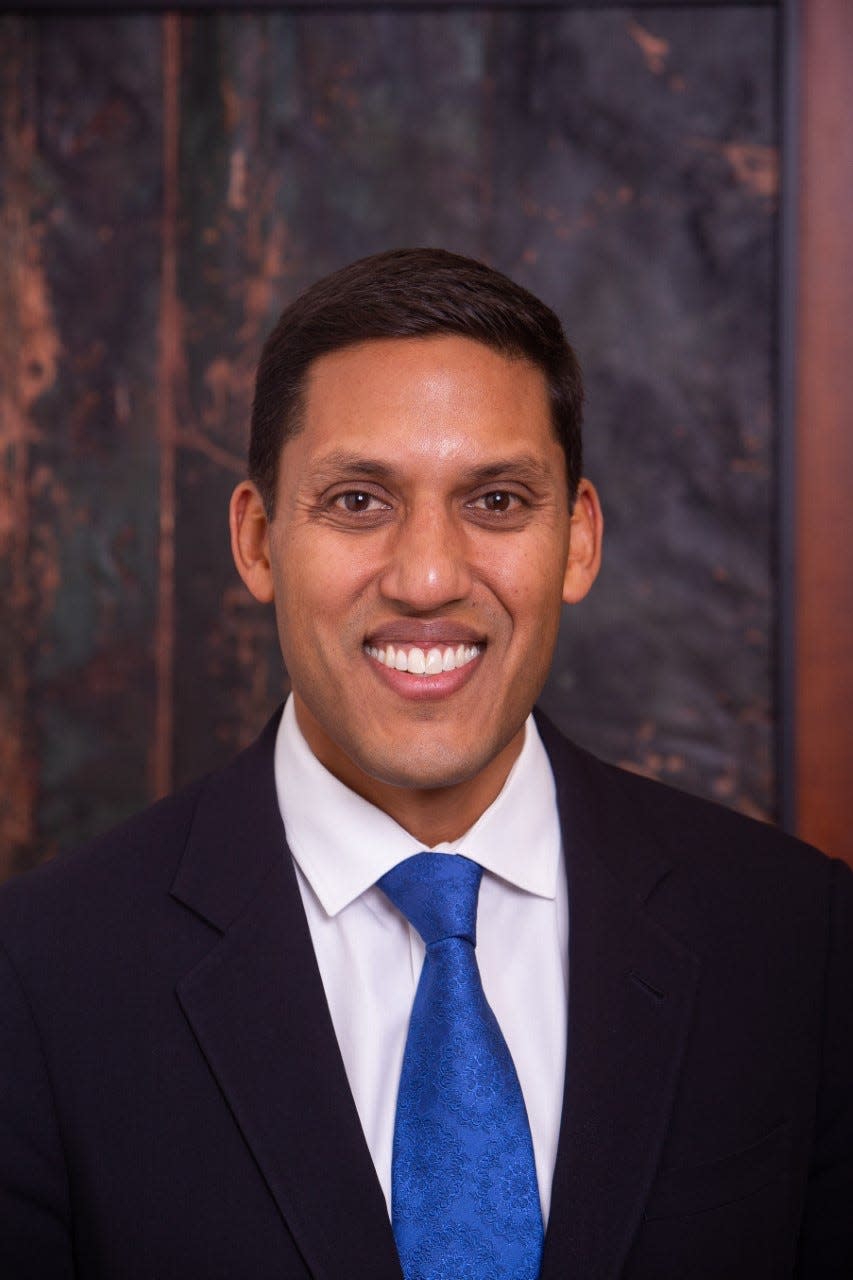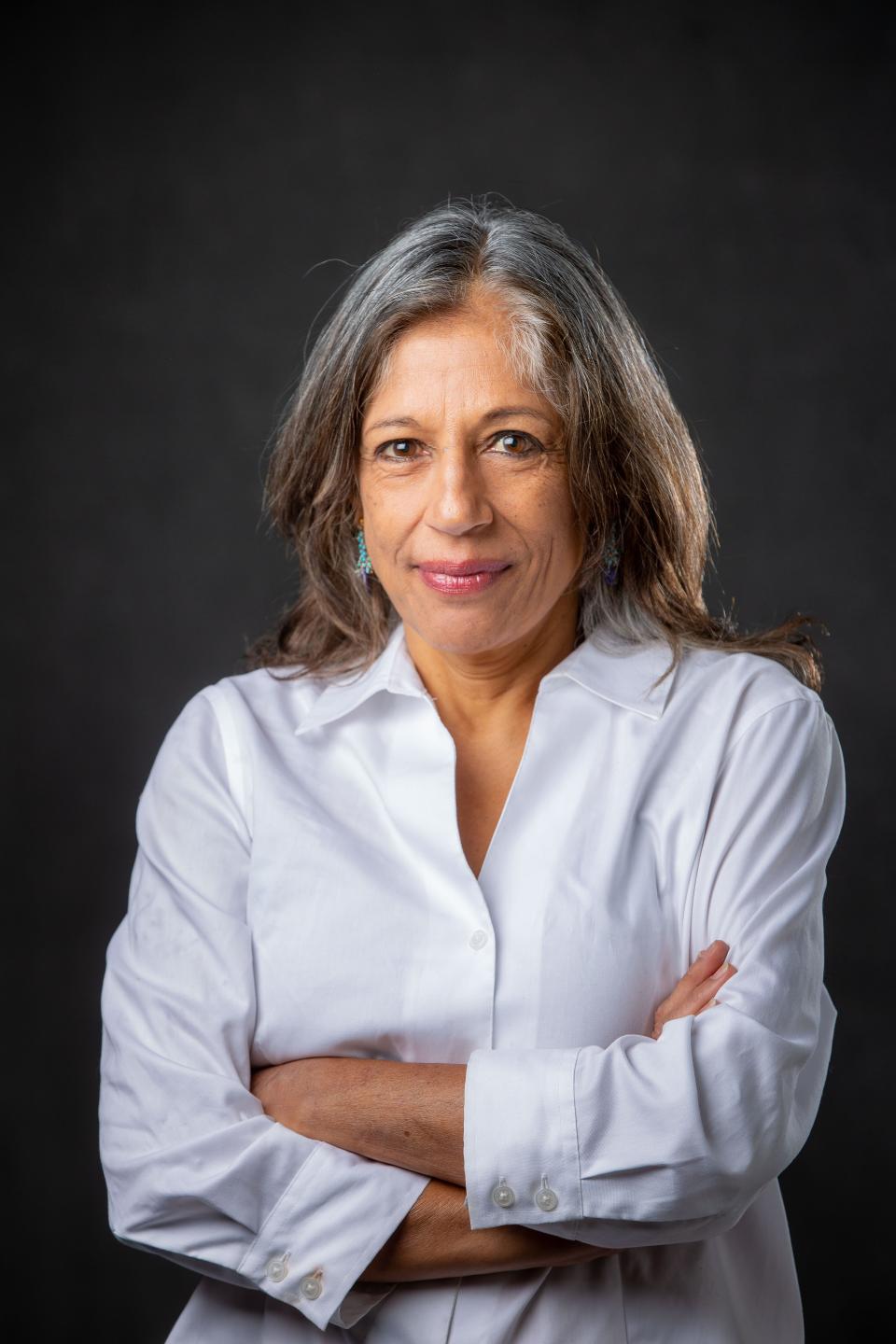Rekha Basu: Big goals can come to fruition. Just ask Rajiv Shah.
- Oops!Something went wrong.Please try again later.
- Oops!Something went wrong.Please try again later.
It’s that time for looking backward and forward, ruminating on what you did this year that mattered, and what you could do next year that might. Which isn’t easy if you’re a realist overwhelmed by the enormity of the world’s challenges: The horrors unfolding in Israel and Gaza. The growing toll of climate change, and gun violence. A political divide so toxic and wide that some families can’t share a holiday meal as they once did.
Against this backdrop, maybe you come in contact with Rajiv Shah, as I did recently in Des Moines. He’s president of the Rockefeller Foundation and author of the recent book “Big Bets: How large-scale change really happens” (Simon and Schuster). He wrote it to encourage change agents to think bigger and bolder on cutting climate change, moving people out of poverty and supporting democracy and open elections, among other things.
“You have to make it personal,” Shah said as we chatted in his hotel lobby before he spoke to The World Food Prize. “It cannot just be transactional. Avoid the aspiration trap. Because these problems feel so big, it’s easy to overlook the successes.” And Shah has chalked up quite a few.

As administrator for the U.S. Agency for International Development (USAID) under the Obama administration, he orchestrated a $2.4 billion effort to fight the Ebola virus in West Africa, which saw Liberia’s cases fall by 90%. That took collaboration between dozens of countries and non-governmental organizations. It was the first time U.S. military personnel were employed in peacetime as first responders, and later in building and training local health care teams.
After Haiti suffered a massive earthquake that would claim 220,000 lives and crush its infrastructure, Shah teamed up with the director of the Federal Emergency Management Agency to launch one of the largest U.S. humanitarian responses in history. Within 48 hours, it deployed 20,000 civilian and military personnel along with transport aircraft and 700 Urban Search and Rescue Team members.
And as chief economist at the Gates Foundation under Melinda and Bill Gates (then chairman of Microsoft Corp.), Shah struggled to turn into reality their $750 million commitment to immunize every child in the world against preventable diseases. Vaccines were too costly and largely unavailable in the developing world because of pharmaceutical companies’ patent restrictions. After doing the math, Raj helped create an International Finance Facility for Immunisation, which, he wrote, has vaccinated 980 million children and saved 16 million lives. Past efforts had failed, his book contends, because big institutions were thinking too small. By the mid-1990s, those efforts plateaued, leaving nearly half of the world’s 11.5 million children under 5 to die unnecessarily.
Neither a polemical argument nor a call to civil disobedience, his book charts successes and failures in what he calls a “radical effort to find a better way.” That is, to go beyond crisis response to forge long-term changes. One key has been bringing together diverse interests — philanthropists, aid workers, activists, lawyers, financiers, heads of state, big organizations and different sectors of government.
After starting in medicine, slowly finding a place in philanthropy
I’ve never read a book quite like this one, and it spoke to me in part because I related to Shah’s back story. Like him, I was raised in the U.S. by middle-class Indian parents, had my name constantly mispronounced and felt as if I never fully belonged. His commitment to making a difference was like mine, as he put it, to “broaden the circle, helping push the boundaries so that others might feel welcome.” Like many Indian parents, Shah’s wanted him to be a doctor, and he completed medical (and business) school. After college he interned at a clinic in Gujarat, India, to treat child leprosy, but realized the bigger problem there was child hunger, which the doctor who founded the clinic tried hard to tackle by offering children free meals. Shah ultimately found his way to philanthropy, which he had once dismissed as “mostly focused on making the status quo more tolerable with small improvements and an easy-listening soundtrack.”
He faced a few setbacks and embarrassments along the way. His first sit-down with Gates was to discuss a proposal Shah had sent him for a “social impact bond” to pay for vaccines, with wealthy nations repaying the debts. Gates declared it “the stupidest thing I’ve ever heard, illegal and convoluted.” But, ever the optimist, Shah wrote, “What I needed to do was worry less about Bill’s tone and focus on using his list (of concerns) as a path to yes.”
He wrote about a USAID project that fell apart despite collaboration between the U.S., China and the Democratic Republic of Congo because of a U.S. Senate vote. A proposed $12 billion hydropower dam promised to bring electricity to a country where 91% lacked it. Human rights advocates worried about dams displacing communities. Environmentalists, as Shah acknowledged, feared them flooding valleys and stressing fish and other wildlife. Shah had worked with the Nature Conservancy to allay such concerns, believing, he wrote, that “the extraordinary gains to so many hundreds of millions of ordinary Africans would convince people to say yes.” What he hadn’t bargained for was the opposition of Democratic Sen. Patrick Leahy of Vermont on the Senate Appropriations Committee. Leahy arranged for a vote on an amendment denying support for large hydroelectric dams. The U.S. later abstained from voting on the project at the World Bank, effectively ending it.
But in another arena Shah found an unexpected ally in conservative Republican Sen. James Inhofe, who ultimately voted to pass the Global Food Security Act that Shah championed. That was after Shah, understanding the extent to which Inhofe’s Christian faith drove his sense of charity, had accepted his invitation to attend the Christian Senate Prayer Group. Shah is Hindu. Sometimes there are unlikely allies.
Post-USAID: Bringing electricity and food where they are lacking
After leaving USAID, he continued his quest to combat what he calls the “energy poverty” affecting nearly 800 million people lacking power in South Asia, parts of South America and across Africa. In 2015, he helped start a private equity firm, Latitude Capital, to attract investors to finance universal electrification. As he wrote, “While a teen-ager in California can drive a Tesla to an after-school coding class, a teen in the Democratic Republic of Congo must risk electrocution from splicing wires atop a utility pole – all for the electricity to light an extra lamp in order to study after dark.”
With Shah onboard, the Rockefeller Foundation has launched a program to bring power to a billion people who lack it. And in September the foundation pledged over $1 billion to fight climate change. Shah is calling on the largest food producers to ensure half of their supply chain companies invest in “climate smart, resilient agriculture.”
In one of the book’s more personal ruminations, Shah explores the risks of what some might call selling out our values. After starting a private equity firm, he was at a European airport in 2016 and decided to buy his wife an expensive Rolex watch. He called her first to see if she’d like one. Her response? “‘Why on Earth would you do that?’ She was deeply upset that I thought she had any interest in a Rolex, and that such a status symbol even appealed to me,” he wrote. “As I hung up and apologized to the sales clerk, I worried if my own goals had become muddled.”
Not many of us have the option of buying Rolexes as gifts. But even if we don’t work for well-endowed foundations or have the ears of movers and shakers, there’s plenty we can do to hold those in power accountable. Getting informed and cutting through misinformation is a start, Shah says. He told a Washington Post Live interview he’d like to see people “complaining aggressively about a food system that is making us sick and destroying our planet.”
Speaking up, writing to office-holders, turning out to vote and urging others to are all ways to fight off cynicism and apathy, and move boldly into a new year. Even as more Americans look inward, let’s keep our eyes on the whole world.

Rekha Basu is a longtime syndicated columnist, editorial writer and reporter, whose work has appeared in all but two U.S. states. She retired last year as a columnist for The Des Moines Register.
This article originally appeared on Des Moines Register: Big goals can come to fruition. Just ask Rajiv Shah.

